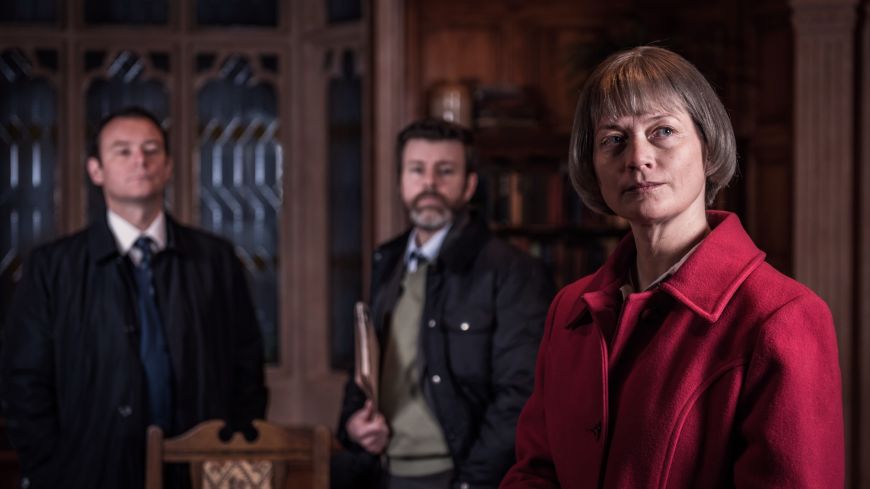
Ruth Rendell, who died aged 85 in 2015, was a multi award winning Queen of Crime, author of sixty-six murder mysteries.
First published in 1977, “A Judgement in Stone” begins with a shocking sentence, which reveals the culprit of a modern day St. Valentine’s Day massacre. The original crime took place on 14th February 1929, when a Chicago mob of seven men were gunned down, the killing, allegedly, planned by Al Capone.
Rendell takes this factual premise for her terrifying tale of the cold blooded murders of George, Jacqueline, Melinda and Giles Coverdale who are shot one by one, as they are watching a performance of Mozart’s opera, Don Giovanni on television.
On the page, the investigation delves into a dark, dramatic, whydunnit. However, in adapting the novel for the stage, Simon Brett and Antony Lampard have cleverly turned the narrative around, omitting the identity of the killer at the start, to create a classic whodunit.
The setting is around early Autumn, 1978 at Lowfield Hall, the grand country house home of the Coverdale family; the oak panelled living room features a fireplace, Chesterfield sofa and bookshelves with doors leading to the hall and kitchen and windows overlooking the garden.
Scene one and Detective Superintendent Vetch and his sidekick Detective Sergeant Challoner are quizzing the housekeeper about the tragic deaths of the family. This is a standard Police Procedural, as acted out in numerous TV series, with the calm, meticulous questioning of staff and villagers to find out the motive and madness behind such a massacre.
Like a series of filmic flashbacks, the action alternates between real time and the months leading up to the murders. We meet and observe the members of this wealthy, upper middle class family, the parents, George and Jacqueline, and spoilt, over-indulged children, Melinda (23), Giles (18). With holidays in Greece and a team of hardworking staff, they have a seemingly carefree life, Downton Abbey-style.
Jacqueline Coverdale, with her Sloane-Ranger accent and attitude is obviously a woman accustomed to paying people to manage the household. The difference in the social backgrounds between Mistress and servant is clearly illustrated when the dowdy Eunice Parchman arrives to be interviewed for a job as housekeeper. “Did you get a taxi from the station?”, the glamorous Mrs C. casually asks. After a pause, Eunice replies that she enjoyed the walk. The truth of course is that she could never afford it, and probably never taken a cab. She is deferential, addressing her as “Madam”, giving a curtseying bob when she leaves, having been offered the position.
And so with fast paced, neatly choreographed, time shifting scenes, the drama moves from past to present as the investigation explores the underlying social, moral and psychological causes for the crime.
The key suspects are Eva, the daily help, Rodger, the gardener, Eunice, the housekeeper and Joan, the postmistress. Some have had a shady or racy past, creating a scattergun of very fishy red herrings.
There are moments of humour too, such as when Eva is quizzed about Joan’s rather crazy personality - could she be a killer?. “She’s daft, but not that daft!”
As the fate of the Coverdale family is revealed in the first few minutes of the play, we know what’s going to happen on 14 February. With the mellifluous music of Mozart’s opera soaring in the background, the dramatic re-enactment is still extremely shocking.
While the final denouement is quite weak in terms of plot-line, characterisation and motive, this is an entertaining and gripping production by the Classic Thriller theatre company.
Showtimes:
Monday 13 - Saturday 18 February, 2017
On tour - http://www.kenwright.com/microsite/a-judgement-in-stone/

